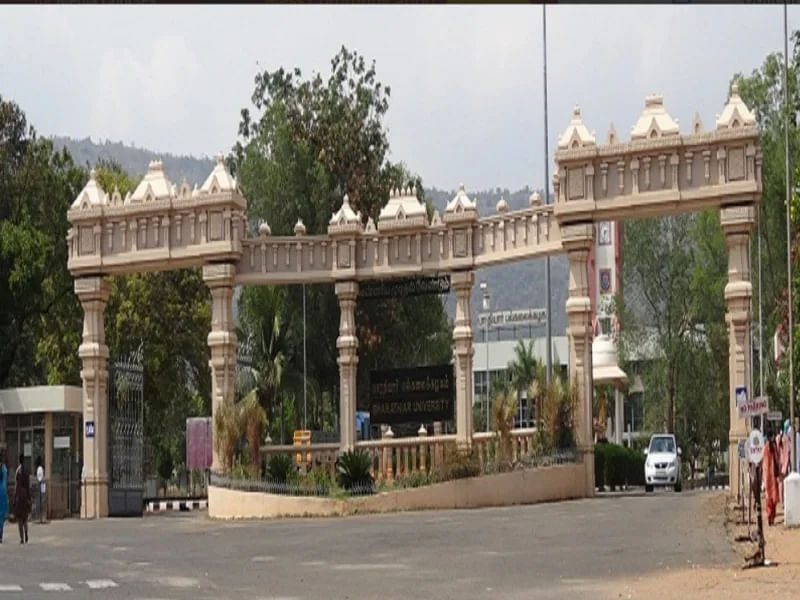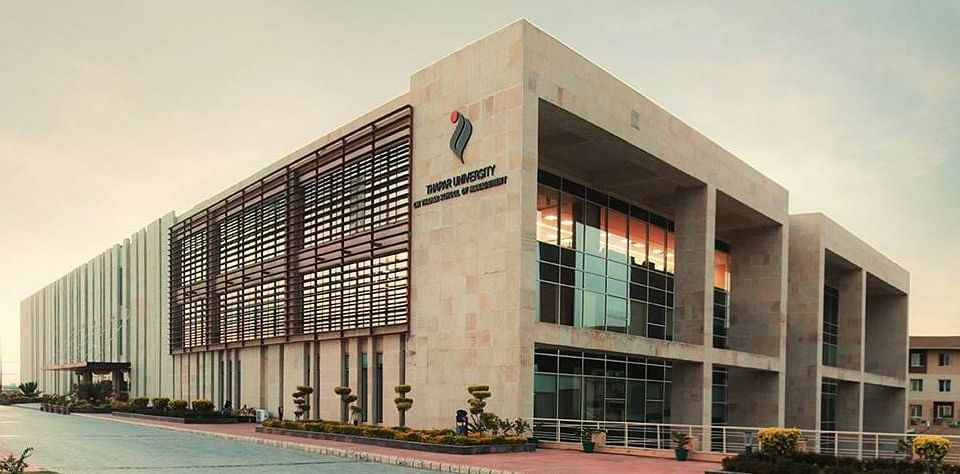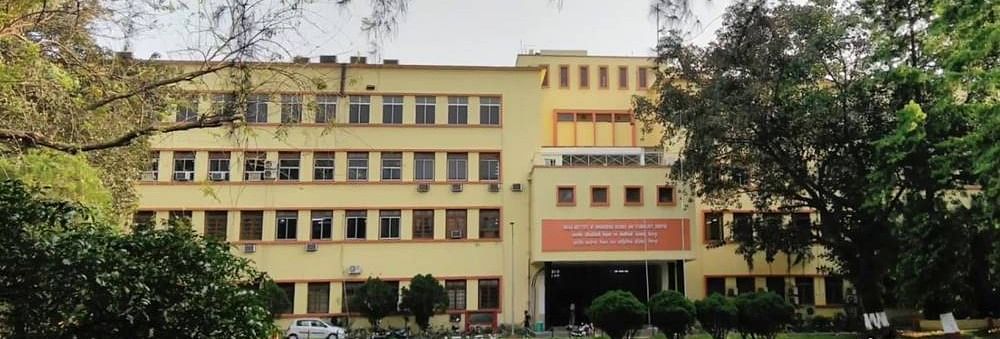MBA in Finance: Admission 2026, Eligibility, Fees, Top Colleges, Job Scope

MBA in Finance is a two-year postgraduate degree, based on essential concepts of finance, accounting, and economics along with in-depth knowledge of financial planning, budgeting, forecasting, etc. The MBA in Finance syllabus develops a comprehensive understanding of core topics like financial management, investment analysis, risk management, cost accounting, time value of money, banking systems, etc.
MBA in Finance admission requires students to have a 50-55% aggregate score in bachelor's degree along with qualifying entrance exams such as CAT, XAT, MAT, GMAT, CMAT, NMAT etc., as part of the eligibility criteria.
Table of Contents
- MBA in Finance Overview
- What is MBA in Finance?
- MBA in Finance Eligibility Criteria
- Why Choose MBA in Finance?
- MBA in Finance Admission 2024
- MBA in Finance Entrance Exams 2024
- MBA in Finance Cutoff 2024
- MBA in Finance Fees Structure
- Top MBA in Finance Colleges in India
- Top MBA Colleges As Per NIRF Ranking 2024
- MBA in Finance Subjects and Syllabus
- MBA in Finance Salary in India
- Career Options After MBA in Finance Course
- MBA in Finance Scholarships
- Top Recruiters for MBA in Finance
- Skills to Excel as an MBA in Finance Graduate
MBA in Finance Course Details
| Degree | Masters |
| Full Form | Master of Business Administration in Finance |
| Duration | 2 Years |
| Age | No specific age restriction |
| Entrance Exam | CAT, XAT, CMAT, etc. |
| Minimum Percentage | Candidate should have completed a bachelor's degree with a minimum of 50-55% marks. |
| Average Fees | 6 Lakh - 31 Lakh |
| Average Salary | INR 4 LPA - INR 20 LPA |
| Employment Roles | Financial Analyst, Finance Manager, Business Analyst - IT, Operations Manager, Relationship Manager, etc. |
| Top Recruiters | JP Morgan, KPMG, Goldman Sachs, Deloitte, HSBC Bank, etc. |
MBA in Finance Overview
MBA in Finance full form stands for Master of Business Administration in Finance and falls under the umbrella of MBA. BITS Pilani, SIBM Hyderabad, Amity University, and IIM Kozhikode are among the top MBA in Finance colleges in India.
The average MBA in Finance course fees are in the range of INR 5 lakh-INR 31 lakh for colleges in India. The MBA in Finance fees at IIMs range between INR 13 lakh to INR 35 lakh whereas fees at other private colleges range between INR 6 lakh to INR 24 lakh.
The course module is industry-relevant and equips graduates with substantial knowledge of finances, markets, cash flow, stocks, and current business trends to acquire potential job opportunities with an average salary package of INR 4 LPA to INR 20 LPA. Hence, an adequate amount of job opportunities are available for graduates with MBA in Finance in investment banking, consulting, merchant banking, private banking, and much more.
What is MBA in Finance?
MBA Finance is a two-year postgraduate degree divided into four semesters. MBA Finance research focuses on the management and evaluation of collection, administration, investment, and resources. In the Finance course, students will learn how to assess business data, implement stock value techniques, manage profitability and risk, evaluate investments, etc.
The MBA Finance course opens up several opportunities in the financial world. Applicants who want to study at India's top business institutions, such as IIMs, should have at least one to two years of experience. It will give them an advantage when applying for admission. There are numerous exciting career opportunities available after earning an MBA in finance.
MBA Finance syllabus and subjects focus on a comprehensive understanding of finance principles, theories, concepts, and their application in real-world business scenarios.
Also Read: Top 10 MBA Colleges in Mumbai with Low Fees 2024
MBA in Finance Eligibility Criteria
All management colleges in India have similar entrance eligibility requirements for MBA Finance students. A bachelor's degree with a management focus is required for students. Candidates can start the application procedure if they've met the requirements.
|
Particulars |
Details |
|
Graduation |
A minimum of 50% aggregate or comparable CGPA in a bachelor's degree from a recognised university. |
|
Entrance Exams |
Most institutes admit candidates based on their entrance exam scores, such as CAT, XAT, CMAT, MAT, and SNAP. |
|
Reserved Category |
For Reserved category students, the minimum aggregate required is 45%. |
Why Choose MBA in Finance?
There are several benefits of pursuing MBA in Finance. It is a popular course and has much more to offer students. Check out the reasons to opt for MBA in Finance.
- MBA finance course is ideal for students who desire to thrive in finance and enhance their professions. In India, the financial sector grows at a rate of approximately 8.5% each year. This means that doing an MBA in Finance in India will open up numerous prospects for advancement.
- Financial analysts are immensely beneficial to both the public and private sectors. Finance is a sector that is not limited to a particular industry and is very diverse.
- Students gain diverse skills and knowledge in business and finance, which opens the door to future career prospects. They research investment strategies, business risks, as well as global economic and corporate risks. The compensation after completing an MBA Finance programme is fairly good.
MBA in Finance Admission 2024
Admission to MBA in Finance course for most Tier-1 and Tier-2 colleges is usually based on merit earned in MBA entrance exams and performance in the GD/PI sessions along with fulfilling certain eligibility criteria. However, some colleges may conduct their own aptitude tests but admission through management quota is not available for enrollment to the MBA in Finance course.
Listed below are the MBA in Finance requirements for the admission process followed by universities across the country:
- Step 1: The students need to clear the entrance exam cut-off as required by the respective colleges.
- Step 2: The candidate should fill out the application form for respective colleges available online and offline mode.
- Step 3: After assessing the candidate application, the colleges roll out the list of shortlisted candidates for GD and PI sessions.
- Step 4: After the final merit list is published, the candidate needs to complete the document verification and pay the fees.
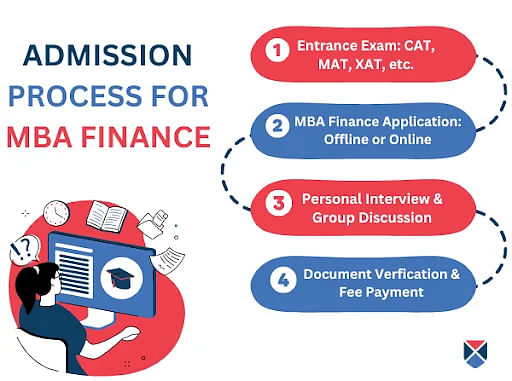
MBA in Finance Entrance Exams 2024
Admission to the MBA in Finance course is based on direct entry or entrance tests. Reputable colleges use a merit-based admissions process and a cutoff score for entrance tests. Admissions are determined solely by the availability of seats, which varies in every college.
Some of the common entrance tests for admission to MBA in Finance programs are:
|
Exam Name |
MBA in Finance Exam Dates |
Participating Colleges |
|
24 Nov, 2024 |
IIM Bangalore, IIM Kozhikode, MDU |
|
|
14 Aug - 25 Aug, 2024 |
IPE Hyderabad, DSB, Jain University |
|
|
Jan 5, 2025 |
XLRI Jamshedpur, IMT Ghaziabad, K J Somaiya Institute of Management |
|
|
5 Nov - 20 Dec, 2024 |
SVKM NMIMS, T A Pai Management Institute, Amity University |
|
|
31st July, 2024 (conducted) |
Christ University Bengaluru, Institute of Management Studies (IMS) Ghaziabad, Jaipuria Institute of Management Noida, Delhi School of Business |
|
|
8th Dec, 15 Dec, 21 Dec 2024 |
SIBM Pune, SICSR Pune, SIOM Nashik |
MBA in Finance Cutoff 2024
The MBA in Finance in India cutoff for admission to a university is based on the seats available and the administrative decision to enroll the candidates in the university. The number of applicants and their entrance examination scores, which vary by institution, determine the MBA Finance cutoff. Below is a list of some of the important entrance exams and their cut-off in various colleges:
CAT Cutoff 2024 For MBA In Finance
Common Admissions Test, or CAT, is a computer-based exam administered by the Indian Institute of Management (IIM). IIMs and other respected business schools rely on the MBA finance cut-off for their primary enrollment process. The minimum score required to apply to MBA programs is the CAT cutoff for MBA finance. The CAT cutoff for MBA finance is very high, which adds to the difficulty level because of several applications.
|
College Name |
Expected CAT Cutoff 2024 (Percentile) |
|
98+ |
|
|
90+ |
|
|
99+ |
|
|
90+ |
|
|
95+ |
|
|
95+ |
|
|
85+ |
|
|
90+ |
|
|
95+ |
CMAT Cutoff 2024 For MBA In Finance
Common Management Admissions Test (CMAT) is another widely accepted entrance-level exam like CAT. Given that the majority of the applicants chose the CAT, the CMAT cutoff for MBA finance is lower than the CAT, making it a more convenient fallback alternative. However, the CMAT is as demanding.
|
College Name |
Expected CMAT Cutoff 2024 (Percentile) |
|
99.9 |
|
|
99.85 |
|
|
99.06 |
|
|
99.2 |
|
|
97.27 |
|
|
PUMBA DMS |
96.42 |
|
95 |
|
|
90 |
|
|
85 |
|
|
82 |
MAT Cutoff 2024 for MBA in Finance Course
The Management Aptitude Test is another popular management admission test with a moderate level of difficulty. When compared to other exams, the MAT cutoff for MBA Finance is easier to meet. The most significant distinction between the MAT and the CAT is the frequency of exam occurrence per year, which for the MAT is fourfold per year.
The expected MAT 2024 cutoff for the MBA Finance course is as follows:
|
Name of the College |
Expected MAT Cutoff (Percentile) |
|
80 – 85 |
|
|
80 – 85 |
|
|
80 – 85 |
|
|
80 – 85 |
|
|
80 – 85 |
|
|
80 – 85 |
|
|
80 – 85 |
|
|
80 – 85 |
|
|
80 – 85 |
|
|
80 – 85 |
MBA in Finance Fees Structure
MBA in Finance fees structure varies from college to college. Doing MBA in Finance in India can cost around INR 1.4 Lakh - INR 31 Lakh. The list of top colleges accepting MBA in Finance includes IIM Calcutta, IIM Bangalore, IIM Kozhikode, JBIMS Mumbai, etc.
Also Read: Why MBA In Finance?
Top MBA in Finance Colleges in India
The list of MBA in Finance Colleges in India comprises IIM Ahmedabad, NMIMS Mumbai, NIBM Pune, IMI Delhi, IIM Bangalore, etc. Check out the average fees and exams accepted by the MBA Finance Colleges in India.
|
College Name |
Average Fees (INR) |
Exams Accepted |
|
INR 31 lakh |
CAT |
|
|
INR 24.5 lakh |
CAT |
|
|
INR 21 lakh |
CAT |
|
|
INR 6 lakh |
CAT, CMAT, GMAT, MAT, MAHCET |
|
|
INR 25 lakh |
CAT |
|
|
INR 23.90 lakh |
NMAT |
|
|
INR 17.34 lakh |
NMAT, CAT, XAT, GMAT |
|
|
INR 16.2 lakh |
CAT, XAT, CMAT, GMAT, GRE |
|
|
INR 18.2 lakh |
CAT, XAT, GMAT |
Also Read: Management Quota (Category B) MBA Admission through AP ICET 2024
Government Colleges for MBA in Finance
The top government colleges for MBA in Finance are known for their academic excellence, affordability, and strong industry contacts. Some of the best MBA in Finance government colleges that provide MBA in Finance in India include:
|
College Name |
Average Fees (INR) |
|
INR 31 lakh |
|
|
INR 13 lakh |
|
|
INR 10 lakh |
|
|
INR 20 lakh |
|
|
INR 9 lakh |
|
|
INR 4 lakh |
|
|
INR 8 Lakh |
|
|
INR 7 lakh |
|
|
INR 47,000 |
|
|
INR 17 lakh |
Private Colleges for MBA in Finance
When it comes to the best private colleges for an MBA in Finance, some institutions stand out due to their great programs and strong industry contacts. These universities provide solid curricula, skilled instructors, and extensive career assistance to help students advance in the financial sector. Some of the best MBA in Finance private colleges that provide MBA in Finance in India are:
|
College Name |
Average Fees (INR) |
|
INR 1.4 lakh -INR 3 Lakh |
|
|
INR 7.6 lakh - INR 9.6 lakh |
|
|
INR 9 lakh -INR 11 lakh |
|
|
INR 10.6 lakh |
|
|
INR 12.2 lakh |
|
|
INR 18 lakh |
|
|
18.3 Lakh |
|
|
INR 23.9 lakh |
|
|
INR 23.9 lakh |
Also Read: List of MBA colleges for 60-70 percentile in CAT 2024
Top MBA Colleges As Per NIRF Ranking 2024
Candidates can check out the list of top 10 MBA Colleges as per NIRF Ranking 2024 in the table below.
|
College Name |
NIRF Ranking 2024 |
|
Indian Institute of Management Ahmedabad |
1 |
|
Indian Institute of Management Bangalore |
2 |
|
Indian Institute of Management Kozhikode |
3 |
|
Indian Institute of Technology Delhi |
4 |
|
Indian Institute of Management Calcutta |
5 |
|
Indian Institute of Management Mumbai |
6 |
|
Indian Institute of Management Lucknow |
7 |
|
Indian Institute of Management Indore |
8 |
|
XLRI - Xavier School of Management |
9 |
|
Indian Institute of Technology Bombay |
10 |
MBA in Finance Subjects and Syllabus
MBA in Finance is one of the most popular specialisations. This two-year course teaches students managerial and administrative skills that will help them shape their careers. After completing an MBA in Finance, graduates can apply their newly acquired abilities in the workplace and advance to top management positions in the financial sector.
MBA in Finance syllabus and subjects are field-specific, thus prior experience with accounting, finance, banking, taxation, and so on is required. Candidates who have studied Commerce in HSc and graduated are more likely to pursue an MBA in Finance because they are already familiar with this field. Those without a commerce background can still pursue this specialisation, although they may need to work harder on the MBA in Finance topics to succeed.
Check out the core subjects and electives below:
|
Core Subjects |
Elective Subjects |
|
Joy of Management |
Credit Analysis and IPO Analysis |
|
Micro-Economics |
Alternative Investments and Portfolio Management |
|
Business Statistics |
Mergers and Acquisitions |
|
Organisational Behaviour |
Wealth Management |
|
Financial Statement Analysis and Reporting |
Business Valuation and Modelling |
|
Marketing and Consumer Behaviour |
Advanced Corporate Finance |
|
Business Research Methodology |
Behavioural Finance and Technical Analysis |
|
Operations Research |
Derivatives and Financial Risk Management |
|
Macro-Economics & Policy |
Syllabus for MBA in Finance
The MBA Finance curriculum covers topics such as financial planning, financial functions, cost of capital, and more. These subjects provide information regarding market dynamics. The MBA Finance program offers one of the most industry-relevant course frameworks, making it appealing to students and companies.
|
MBA in Finance Syllabus (Year 1) |
MBA in Finance Syllabus (Year 2) |
|
Macroeconomics and Business Environment |
Cash Management |
|
Managerial Economics |
Dividend Decisions |
|
Financial Management |
Theories of Capital Structure |
|
Financial Functions |
Capital Budgeting |
|
Leverage |
Capital Rationing |
|
Cost of Capital |
Money and Capital Markets |
|
Valuation of Bond and Shares |
Portfolio Analysis |
|
Advanced Marketing |
Risk Analysis in Capital Budgeting |
|
Cost of Different Sources in Finance |
Statistics for Business |
|
Capital Structure |
Working Capital Management |
|
Macroeconomics |
Capital Rationing |
|
Introduction to Time, Value and Money |
Money and Capital Markets |
MBA in Finance Salary in India
MBA graduates can find work in various companies because finance is such a broad field. Check out the list of MBA in Finance job scope and salary below:
|
Job Position |
Average Salary Offered |
|
Derivatives Traders |
INR 3.25 LPA |
|
Financial Analysts |
INR 4.22 LPA |
|
Finance Managers |
INR 9.80 LPA |
|
Credit Risk Managers |
INR 13.50 LPA |
|
Assistant Vice Presidents |
INR 20.00 LPA |
Career Options After MBA in Finance Course
Candidates opting for financial management can work in sectors such as risk management, retail industry, private industry, insurance management, financing, treasury, sales and trading, stock market, etc. MBA Finance in India is a very popular course and it provides diverse career opportunities and significant job profiles such as:
|
MBA in Finance Jobs |
Description |
|
Venture Capitalist |
They work as an investor for young companies in exchange for equity. |
|
Financial Risk Analyst |
They assess the risks in the firm and plan a risk management procedure to ensure smooth cash flow. |
|
Hedge Manager |
They oversee the activities of a hedge fund and manage it. |
|
CFO |
They handle the entire financial element of a business and are responsible for its financial health. |
Also Read: MBA Marketing Vs MBA Finance
MBA in Finance Scholarships
Students pursuing MBA courses get various scholarships provided by private institutes or government schemes. Below is a list of various scholarships provided to MBA Finance students:
|
MBA in Finance Scholarship |
Eligibility |
Scholarship Amount |
|
60% marks in the undergraduate studies |
INR 3 lakh |
|
|
INR 12 lakh- 14 lakh ( Depending on the course) |
|
|
INR 75,000 |
|
|
Only for Indian nationals under the age of 35 years |
INR 2 lakh |
|
|
INR 4 lakh |
Also Read: Top 10 MBA Colleges in Hyderabad Based on Placements
Top Recruiters for MBA in Finance
Graduates with MBA in Finance can acquire potential career opportunities in top MNCs, financial firms, banks, and other major financial enterprises. Some of the top companies that usually hire graduates with MBA in Finance are given below:
|
MBA in Finance Job Designation |
Top Recruiters |
Average Salary |
|
Account Manager |
Amazon, Dell Technologies, Accenture, Airtel, Google TCS |
INR 2.5 LPA- INR 15 LPA |
|
Financial Analyst |
Accenture, Amazon, Deloitte, Wells Fargo, TCS, Oracle |
INR 2 LPA- INR 11 LPA |
|
Business Analyst |
Accenture, TCS, Cognizant, Deloitte, IBM, Amazon |
INR 2.7 LPA- INR 15 LPA |
|
Equity Research Analyst |
JP Morgan, Morningstar, Goldman Sachs, TCS, Deloitte |
INR 2 LPA- INR 22 LPA |
|
Finance manager |
Accenture, TCS, IBM, Genpact, Capgemini |
INR 3.2 LPA-INR 30 LPA |
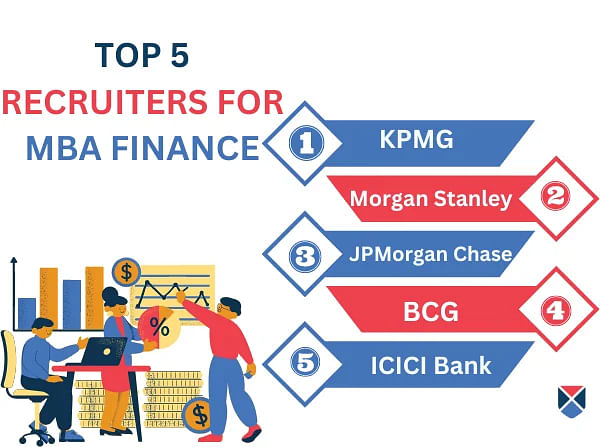
Also Read: List of MBA Colleges Accepting 90+ Percentile in CMAT 2024
Skills to Excel as an MBA in Finance Graduate
Students pursuing an MBA Finance course need a combination of theoretical and practical skills to excel in their careers. The list of skills one must acquire to be the best MBA in Finance course graduate is listed below.
- Analytical Thinking: Candidates must possess the ability to analyze a given situation and come up with the most effective solution in a timely manner.
- Proficiency in Data Analysis: The students must be able to evaluate and find logical techniques in data analysis.
- Financial Reporting: Applicants should possess the ability to efficiently obtain financial statements and reports through appropriate methods.
- Cash Flow Management: Being able to track and manage cash flow in business is a crucial skill necessary for excelling in the job.
- Knowledge of Financial Accounting and Analysis: Candidates should have proper knowledge of accounting and finance to make effective decisions.
- Numerical and quantitative aptitude: This ability is required for making sound decisions through the use of logical reasoning and numerical procedures.
Also Read: Top 10 Government MBA Colleges accepting CMAT 2024 Score
Top MBA in Finance Colleges
Top Management Entrance Exams
MBA in Finance Fee Structure
FAQs on MBA in Finance
Q: What is MBA in Finance?
Q: What courses can I take after my MBA in Finance?
Q: Is MBA in Finance a good career option?
Q: Can Science students study MBA Finance?
Q: How many MBA Finance colleges are there in India?
Q: What is the banker’s salary after an MBA in Finance?
Q: What is the average salary offered after completing an MBA in Finance?






